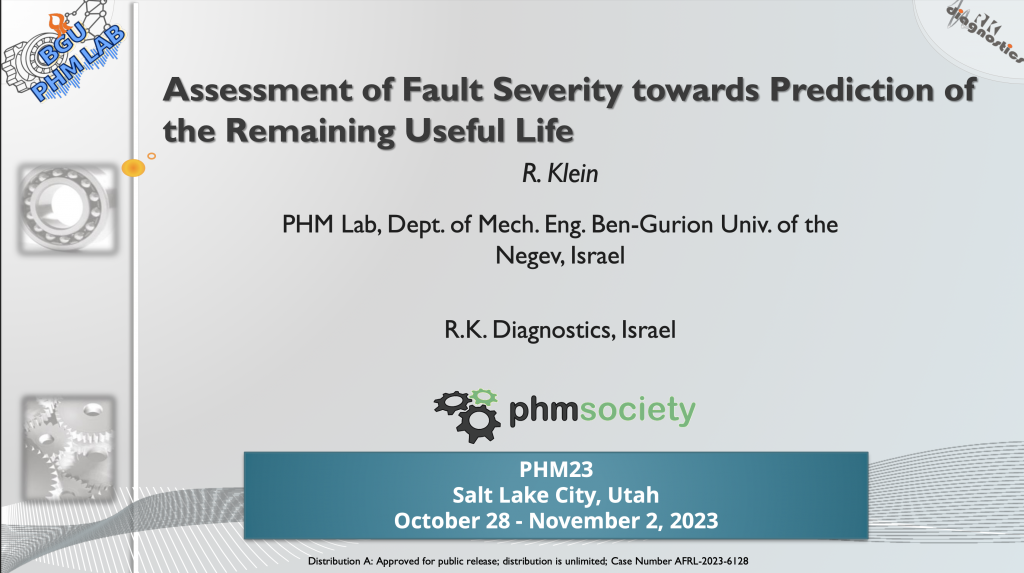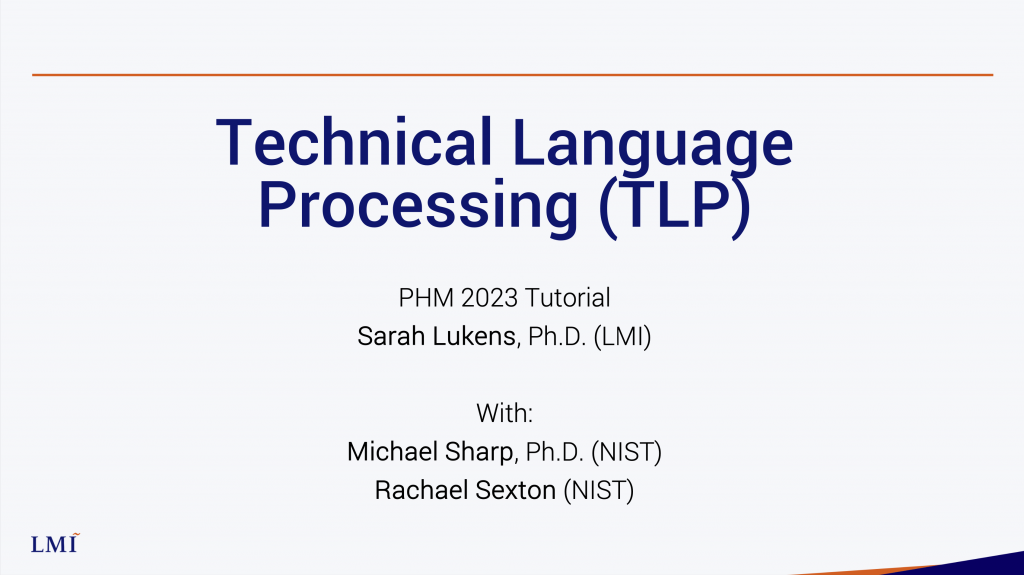Tutorials
One of the unique features of the PHM conferences is free technical tutorials on various topics in health management taught by industry experts. As educational events, tutorials provide a comprehensive introduction to the state-of-the-art in the tutorial’s topic. Proposed tutorials address the interests of a varied audience: beginners, developers, designers, researchers, practitioners, and decision-makers who wish to learn a given aspect of prognostic health management. Tutorials will focus both on theoretical aspects as well as industrial applications of prognostics. These tutorials reach a good balance between the topic coverage and its relevance to the community. This year’s tutorials cover a range of topics.
| Date and Time: Tuesday, October 31 | 9:15 am – 10:45 am |
| Tutorial Session 2: Technical Language Processing |
|---|
| Presenters: Sarah Lukens, LMI
Slides: (Click on the image for tutorial slides)
Video Recording: Description: Technical Language is highly contextual communications found in industry, academia, and other scientific domains where terms may have very different uses or implications than more common natural language. This tutorial introduces participants to Technical Language Processing (TLP), an engineering-oriented approach that leverages AI tools, including Natural Language Processing (NLP), for effective processing of technical language data. Central components of TLP will be covered, starting with engineering use cases related to Prognostics and Health Management (PHM). The tutorial will provide an overview of fundamental concepts from mainstream NLP, including NLP pipelines, pre-processing techniques, and word representation methods with a clear emphasis on the applications and risks of using them in TLP. This tutorial will also highlight existing tools and procedures that aid in cleaning, processing, and analyzing information contained within technical documents of various sizes. We will conclude with a TLP Q&A addressing successes, challenges, and next steps for the community. This tutorial will make use of a code workbook in Python with a dataset for someone who wishes to get started with Technical Language Processing on Maintenance Work Orders with an emphasis on handling dirty data. The code workbook covers basic data handling (such as parsing data types and manipulating dates), handling missing data, and an introduction to inferring structured fields from unstructured text. Speaker Bios: Dr. Sarah Lukens is a Data Scientist at LMI. Her interests are focused on data-driven modeling for reliability applications by combining modern data science techniques with current industry performance data. This work involves analyzing asset maintenance data and creating statistical models that support asset performance management (APM) work processes using components from natural language processing, machine learning, and reliability engineering. Sarah completed her Ph.D. in mathematics in 2010 from Tulane University with a focus on scientific computing and numerical analysis. Sarah is a Certified Maintenance and Reliability Professional (CMRP). |
| Date and Time: Wednesday, November 1 | 9:15 am – 10:45 am |
| Tutorial Session 3: Data-driven Vibration Modeling |
|---|
| Presenter: Manu Krishnan, Joby Aviation
Description: In the domain of aerospace engineering, assessing system health through vibration modeling stands as a cornerstone. Vibrational patterns, as vital indicators of system integrity, demand precise baseline modeling to identify any deviations effectively. However, intricacies in modeling the baseline, particularly in complex systems like turbofan engines, pose significant challenges. This tutorial delves into the heart of these challenges, offering comprehensive insights into the integration of operational data, including variables such as temperature and pressure. Through this integration, a robust data-driven model emerges, serving dual roles: encapsulating baseline vibrations and providing an understanding of the modal characteristics of the system. The tutorial’s focal point lies in exploring cutting-edge data-driven modeling strategies, with a specific emphasis on time domain methods like Dynamic Mode Decomposition (DMD). Par: participants will receive an in-depth understanding of the mathematical foundations of DMD. Moreover, the tutorial will offer practical implementation guidance, presenting working code for DMD and recently developed wavelet-based DMD. Speaker Bio: Dr. Manu Krishnan is a senior Data Scientist at Joby Aviation, CA, USA. He earned his masters in structural engineering from the Indian Institute of Technology, Guwahati (2017) and a Ph.D. in aerospace engineering from Virginia Tech (2021). During his Ph.D., he collaborated with Rolls-Royce and researched various dynamic data-driven modeling methodologies for vibrations in turbofan engines. Soon after his Ph.D., he joined Joby Aviation as a prognostics and diagnostics engineer and transitioned into a senior data scientist role at Joby Aviation. He currently leads a team in developing strategies for real-time issue detection, and predictive maintenance, ensuring the smooth operation of Joby eVTOL aircraft. |


